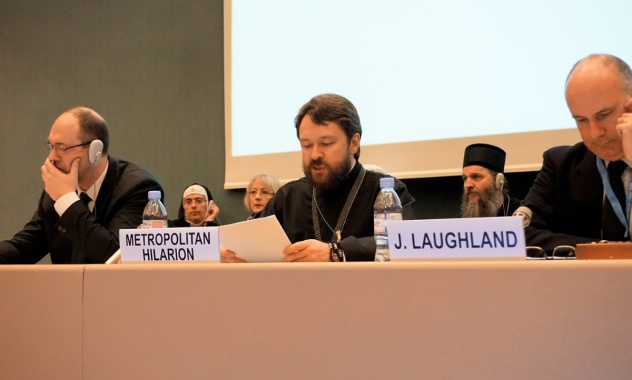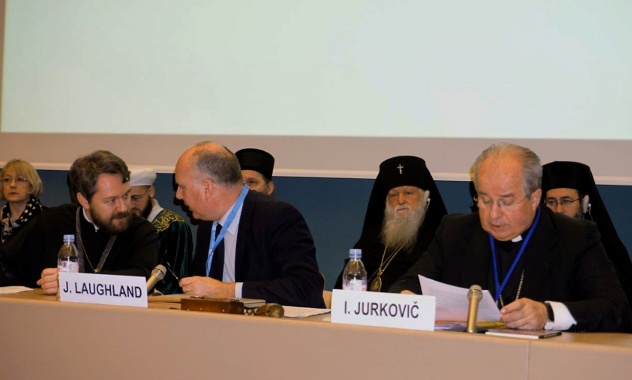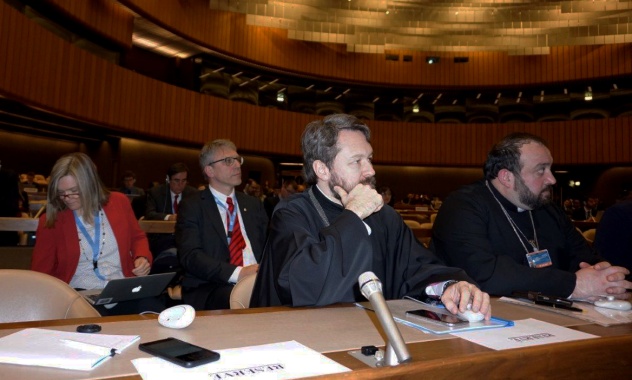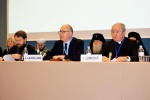Metropolitan Hilarion of Volokolamsk speaks at UN conference on the defense of Christians
On 7 March 2017, an international top-level conference on Mutual Respect and Peaceful Coexistence as a Condition of Interreligious Peace and Stability: Supporting Christians and Other Communities took place in Geneva on the sidelines of the 34th session of the UN Human Rights Council. It was organized on the initiative of the Permanent Missions to the United Nations of Russia, Holy See, Lebanon, Armenia, Hungary, Croatia, Cyprus, Greece, Serbia, Spain, etc., with the assistance of non-governmental organizations – the Imperial Orthodox Palestine Society and the Paris-based Institute of Democracy and Cooperation.
After a brief welcome speech of the moderator, the floor was given for the opening address to Metropolitan Hilarion of Volokolamsk, chairman of the Moscow Patriarchate’s Department for External Church Relations.
Metropolitan Hilarion spoke on a wide range of issues pertaining to the persecution of Christians in today’s world, as well as on the possible ways to overcome crises in the Middle East. He noted that Russia was the unique model of peaceful coexistence of different religious communities, as demonstrated, for instance, by the fruitful activities of the Interreligious Council of Russia.
Addressing the problem of persecution of Christians in various regions, in particular, in the Middle East, the DECR chairman said, “Until recently the scale of persecution and discrimination of Christians has been suppressed, and international organizations preferred to turn a blind eye to this issue. There is still a widespread view that Christians are not subjected to any targeted persecutions but suffer along with the others from the effects of the war. This opinion is deeply erroneous. The Christians who have found themselves in the territories controlled by militants are treated as second-class people at best, provided that they pay a special tax. Christians are often just killed, and the murderers show no mercy either to women or to children.”
Mentioning a widespread view that militants commit their atrocities in the Middle East and in some other parts of the world, acting according to their religious beliefs, Metropolitan Hilarion said, “As a matter of fact, it is not true – there is neither Islamic nor any other terrorism in the name of faith. None of the religions teaches people to kill, to commit evil deeds or terrorist attacks, as is unanimously testified by the Christian, Islamic and Jewish leaders.”
The DECR chairman noted an important role of Christian churches in preventing the exodus of Christians from Syria and the Middle East. “For a religious community, a church is a place where they speak to God, the centre of their spiritual life,” he said, “In fact, it is the only place where people gather together regardless of their age, profession or political views. A functioning church is an opportunity for Christians to return to their native lands. I would like to draw a particular attention of all those present to the necessity of restoring churches in the Middle East. With no churches functioning, it will be difficult for Christians to return to the region.”
In his address, Metropolitan Hilarion also spoke on the situation of the Ukrainian Orthodox Church, reminding the participants in the conference that there are several groups in Ukraine calling themselves ‘orthodox churches,’ but there is only one Ukrainian Orthodox Church of the Moscow Patriarchate that is canonical and recognized by all the other Local Orthodox Churches and the Roman Catholic Church. As the DECR chairman noted, “today the canonical Ukrainian Orthodox Church is being subjected to systematic and targeted persecutions, with churches being taken away from it. To do that, the following mechanism of so-called ‘referendum,’ in reality fictitious, is used: representatives of a schismatic community appear in a village, claiming the ownership of a church and resorting to violence to drive away its parishioners who might have owned this church for decades.”
Such raider methods were used to seize several dozens of churches in Ukraine. In order to legalize this practice, the Verkhovna Rada of Ukraine tried to introduce different legislative initiatives, the head of the Department for External Church Relations pointed out. “We resolutely oppose such gross violation of the rights of believers and call upon the United Nations to devote particular attention to this problem,” he added.
The archpastor also mentioned the cases of violation of the rights of Christians and representatives of other religious communities in today’s Europe. “It is very important for Europe to set an example of interreligious tolerance and cooperation,” he emphasized.
To conclude his address, Metropolitan Hilarion expressed his hope that the world community and religious leaders would show their will to defend the persecuted Christians in the Middle East and in Africa and to prevent the violation of the rights of believers in other parts of the world.
Among the speakers were also Archbishop Ivan Jurkovič, permanent observer of the Holy See to the United Nations Office and other international organizations in Geneva and to the World Trade Organization; Mr. Péter Szijjártó, Hungary’s Minister of Foreign Affairs; Mr. Davor Ivo Stier, Croatia’s Minister of Foreign and European Affairs; Ms Yelena Agapova, deputy chair of the Imperial Orthodox Palestine Society; Mother Agnes Mariam el-Salib, a famous Syrian human rights activist; and Ms Natalya Narochnitskaya, president of the Paris-based Institute of Democracy and Cooperation.
Among those who attended the conference were Archbishop Michael of Geneva and Western Europe; Archpriest Mikhail Gundyaev, representative of the Russian Orthodox Church to the World Council of Churches and international organizations in Geneva; and delegates of the World Russian People’s Council.
The meeting aroused great interest among representatives of various countries accredited to the United Nations Office at Geneva.
DECR Communication Service




























